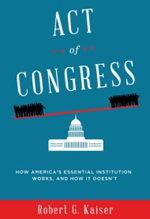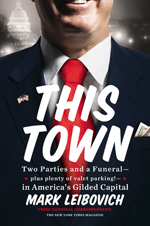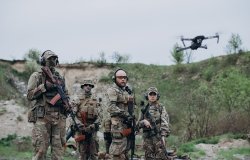Alumni Work Chosen Among Best Books of 2013
The New York Times, The Washington Post, and The Economist have recently published their lists of Best Books of 2013, and we are delighted to see that Wilson Center authors rank high on all the lists.
The New York Times,The Washington Post, and The Economist have recently published their lists of Best Books of 2013, and we are delighted to see that Wilson Center authors rank high on all the lists. Several of our scholars are included based on projects they were working on during their time here. In The New York Times, two of the five best nonfiction books chosen were written by Wilson Center scholars. Four of the 50 notable works of nonfiction selected by The Washington Post were written by Wilson Center scholars.
Other alumni were recognized for recent books. David Finkel, a public policy scholar in 2008, wrote Thank You for Your Service, one of five nonfiction books listed in the year’s top 10 books in The Washington Post and one of the Books of the Year in The Economist. Also in The Economist were the works of David Shambaugh, fellow 2002-2003, for China Goes Global: The Partial Power, and former fellow (1998-99) Ian Buruma, for Year Zero: A History of 1945.
Plenty of good reading as the holiday season approaches!
These books are detailed below:
The New York Times:
 Days of Fire: Bush and Cheney in the White House (Doubleday, 2013) was authored by Peter Baker, Public Policy Scholar from 2010-2011 and Chief White House Correspondent for the New York Times. During his time at the Center, Baker studied George W. Bush’s second term of presidency. His book examines the historic relationship between the President and Vice President over the course of a tumultuous eight years that were defined by the 9/11 terrorist attacks, the Iraq and Afghanistan wars, Hurricane Katrina, and the financial crisis.
Days of Fire: Bush and Cheney in the White House (Doubleday, 2013) was authored by Peter Baker, Public Policy Scholar from 2010-2011 and Chief White House Correspondent for the New York Times. During his time at the Center, Baker studied George W. Bush’s second term of presidency. His book examines the historic relationship between the President and Vice President over the course of a tumultuous eight years that were defined by the 9/11 terrorist attacks, the Iraq and Afghanistan wars, Hurricane Katrina, and the financial crisis.
 Five Days at Memorial: Life and Death at a Storm-Ravaged Hospital (Crown, 2013) was authored by Sheri Fink, Public Policy Scholar in 2010. In harrowing detail, Fink describes the hellish days at a hospital during and after Hurricane Katrina, when desperate medical professionals were suspected of administering lethal injections to critically ill patients. Masterfully and compassionately reported and as gripping as a thriller, the book poses reverberating questions about end-of-life care, race discrimination in medicine and how individuals and institutions break down during disasters.
Five Days at Memorial: Life and Death at a Storm-Ravaged Hospital (Crown, 2013) was authored by Sheri Fink, Public Policy Scholar in 2010. In harrowing detail, Fink describes the hellish days at a hospital during and after Hurricane Katrina, when desperate medical professionals were suspected of administering lethal injections to critically ill patients. Masterfully and compassionately reported and as gripping as a thriller, the book poses reverberating questions about end-of-life care, race discrimination in medicine and how individuals and institutions break down during disasters.
The Washington Post:
 Act of Congress: How America’s Essential Institution Works, and How it Doesn’t (Knopf, 2013) was written by Robert G. Kaiser, an expert on U.S. politics and a Public Policy Scholar in 2010-2011. The book details the inner workings in the House and Senate and the fundamental flaws that have caused low approval ratings of Congress. He argues that the flaws in Congress also cause challenges to the efficacy of democracy. Kaiser follows the responses to the economic crash in 2008, mainly in response to the signing of the Dodd-Frank Act in 2010.
Act of Congress: How America’s Essential Institution Works, and How it Doesn’t (Knopf, 2013) was written by Robert G. Kaiser, an expert on U.S. politics and a Public Policy Scholar in 2010-2011. The book details the inner workings in the House and Senate and the fundamental flaws that have caused low approval ratings of Congress. He argues that the flaws in Congress also cause challenges to the efficacy of democracy. Kaiser follows the responses to the economic crash in 2008, mainly in response to the signing of the Dodd-Frank Act in 2010.
 Days of Fire: Bush and Cheney in the White House (Doubleday, 2013) was authored by Peter Baker, Public Policy Scholar from 2010-2011 and Chief White House Correspondent for the New York Times. During his time at the Center, Baker studied George W. Bush’s second term of presidency. His book examines the historic relationship between the President and Vice President over the course of a tumultuous eight years that were defined by the 9/11 terrorist attacks, the Iraq and Afghanistan wars, Hurricane Katrina, and the financial crisis.
Days of Fire: Bush and Cheney in the White House (Doubleday, 2013) was authored by Peter Baker, Public Policy Scholar from 2010-2011 and Chief White House Correspondent for the New York Times. During his time at the Center, Baker studied George W. Bush’s second term of presidency. His book examines the historic relationship between the President and Vice President over the course of a tumultuous eight years that were defined by the 9/11 terrorist attacks, the Iraq and Afghanistan wars, Hurricane Katrina, and the financial crisis.
 This Town: Two Parties and a Funeral – Plus, Plenty of Valet Parking! – in America’s Gilded Capital (Blue Ridder Press, 2013) gives an account of the nation’s capital that is informative and humorous for all those who are a part of the Washington culture, and those trying to be a part of it. Author Mark Leibovich is The New York Times Chief National Correspondent based in Washington, DC. He is a former Public Policy Scholar (2011) and during his time at the Center studied the changes and effects of media and technology on politics in DC.
This Town: Two Parties and a Funeral – Plus, Plenty of Valet Parking! – in America’s Gilded Capital (Blue Ridder Press, 2013) gives an account of the nation’s capital that is informative and humorous for all those who are a part of the Washington culture, and those trying to be a part of it. Author Mark Leibovich is The New York Times Chief National Correspondent based in Washington, DC. He is a former Public Policy Scholar (2011) and during his time at the Center studied the changes and effects of media and technology on politics in DC.
 The Way of the Knife: the CIA, a Secret Army, and a War at the Ends of the Earth (Penguin, 2013) is Mark Mazzetti’s work on the transition of CIA activities post 9/11 describing America’s hidden pursuits in the shadows of the Iraq and Afghanistan wars. Mazzetti is the National Security Correspondent for the New York Times as well as a Pulitzer Prize winning reporter. He was a Public Policy Scholar in 2011-2012.
The Way of the Knife: the CIA, a Secret Army, and a War at the Ends of the Earth (Penguin, 2013) is Mark Mazzetti’s work on the transition of CIA activities post 9/11 describing America’s hidden pursuits in the shadows of the Iraq and Afghanistan wars. Mazzetti is the National Security Correspondent for the New York Times as well as a Pulitzer Prize winning reporter. He was a Public Policy Scholar in 2011-2012.
The Economist:
David Finkel, former Public Policy Scholar in the Middle East Program (2008), wrote the book Thank You for Your Service, an exploration of the lives of American soldiers returning from combat, many of them physically fit but psychologically wounded. An important and uncomfortable book by the Pulitzer-prize-winning author of “The Good Soldiers”. His new book was written in the United States and details the recovery of soldiers returning from their deployment.
David Shambaugh, former fellow (2002-2003) argues that China’s footprint is “broad, but not deep”, which means it is not nearly as powerful as people think.China Goes Global: The Partial Power(Oxford University Press 2013) is one of the few recent books that says China is not going to take over the world, this work is a welcome antidote to some of the widespread hyperventilating about China’s rise. Scholarly, fascinating and controversial.
Ian Buruma, former fellow, authored Year Zero: A History of 1945 which chronicles the messy end of the second world war and shows how, contrary to the received wisdom, the end of hostilities often benefited the unpatriotic and the unprincipled.










